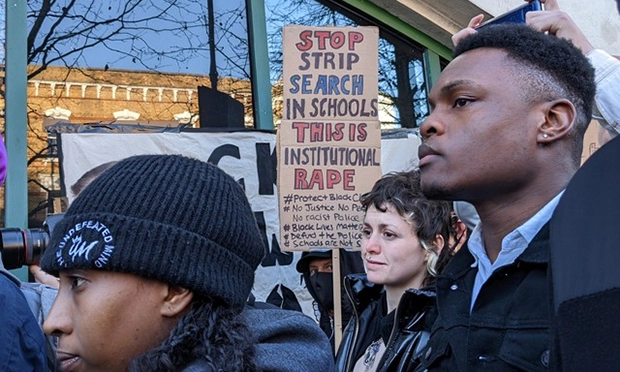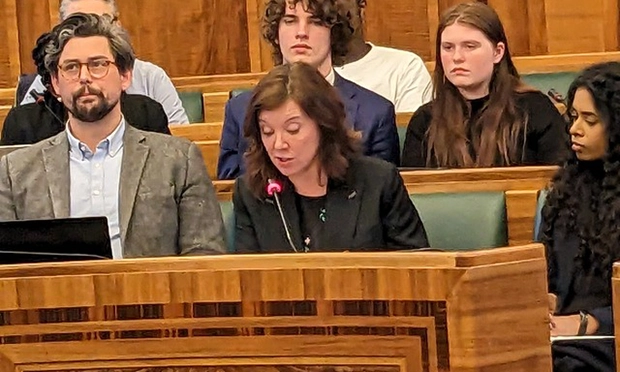Child Q: Laws allowing child strip-searches need ‘radical rethink’, says safeguarding expert

News of Child Q’s treatment sparked protests across the borough last year. Photograph: Julia Gregory
The Child Q scandal should prompt a “radical rethink” of the laws allowing children to be strip-searched, a safeguarding expert has said.
The call came from Jim Gamble, the independent child safeguarding commissioner for City of London and Hackney.
He was speaking at a local scrutiny meeting looking into what has changed in the treatment of minors since the scandal broke last year, when it emerged that a 15-year-old Black girl was strip-searched by police at her Hackney school.
Officers were called in by the school and the teenager was searched without an appropriate adult present or anyone contacting her family.
The news sparked protests across Hackney, and the Independent Office for Police Conduct is investigating three officers over concerns of gross misconduct.
Gamble told the scrutiny commission last night: “If the law allows a child to be searched, then that law is wrong.”
His review last year into what happened concluded that racism was “likely” to have contributed to the Child Q incident.
Children’s Commissioner Dame Rachel de Souza investigated strip-searches of children by police in England and Wales.
She said: “I had hoped to find Child Q’s experience was unique.”
Instead, she found that 2,857 children were strip-searched between 2018 and 2022, with no appropriate adult present in over half of these cases.
She discovered that searches were even happening in public places such as takeaways.
De Souza added that it was “utterly unacceptable that Black children are up to six times more likely to be strip-searched”.
“A very common word we heard from young people after a search was ‘humiliation’,” she revealed.
“We simply cannot tolerate any more cases of this nature. This is not a London issue, or even an isolated incident.”

Children’s Commissioner Dame Rachel de Souza addresses councillors. Photograph: Julia Gregory
Hackney’s new borough commander, James Conway, outlined a series of changes to policing since Child Q’s experience was made public.
He said no such searches have been conducted in the borough in that time, and new safeguards mean senior officers must approve them.
Police are now trained in avoiding ‘adultification’, where young people, especially Black children, are treated as adults by those in authority.
Gamble responded: “If we haven’t had any more searches, there’s no justification for them.
“I cannot see how it’s not better to be arrested if there’s that level of risk, [so the person] can be brought into an environment where it’s supervised and you have access to an appropriate adult, rather than being searched in a premises like a school that you go to everyday.
“You revisit the trauma – this is the problem. We revisit the trauma when we search in places like this.”
He added: “There needs to be a radical rethink, we need to be honest about this.”
Detective Chief Superintendent Conway said police do not want to criminalise children.
Deputy Youth Mayor, Griffin, asked why young people could not be arrested and brought to a police station for questioning rather than being stopped and searched.
Det Chief Supt Conway said: “Police custody is not a place we want to find young children.”
Police are now looking at the proportionality in the use of searches and a having a “much higher threshold” for searches where body parts are exposed, Conway explained, as well as whether they are “necessary and proportionate” with appropriate safeguarding.
He said they should be the “exception”.
Hackney Mayor Philip Glanville said: “The failure of the Metropolitan Police’s commissioner to accept the Casey report findings of institutional racism in the Met is a barrier to moving on.”
The report, published in March, found a catalogue of failings and said the Met was racist, homophobic and misogynistic.
Hackney’s Young Speaker, Sudenaz Top, asked Detective Chief Superintendent Conway how the force is tackling the problems highlighted in the Casey report.
Conway said priorities include disproportionality in stop-and-search, violence, and women’s safety.
He expects officers’ behaviour to be “human and courteous and to treat people with respect across the borough of Hackney”.
He told the commission: “There is no policing power that is worth losing community support.”
Conway also said the history of incidents such as that which befell Child Q has “a cumulative impact that strikes at the heart of the community’s DNA”.
Commission vice chair Cllr Soraya Adejare spoke about the frustration of institutional racism “not being recognised by the top brass” at the Met.
She said the scrutiny commission will also keep monitoring the safegarding of children and behaviour policies at Hackney’s schools.
“No child should experience a different approach in any of our educational settings because of the colour of their skin.”
